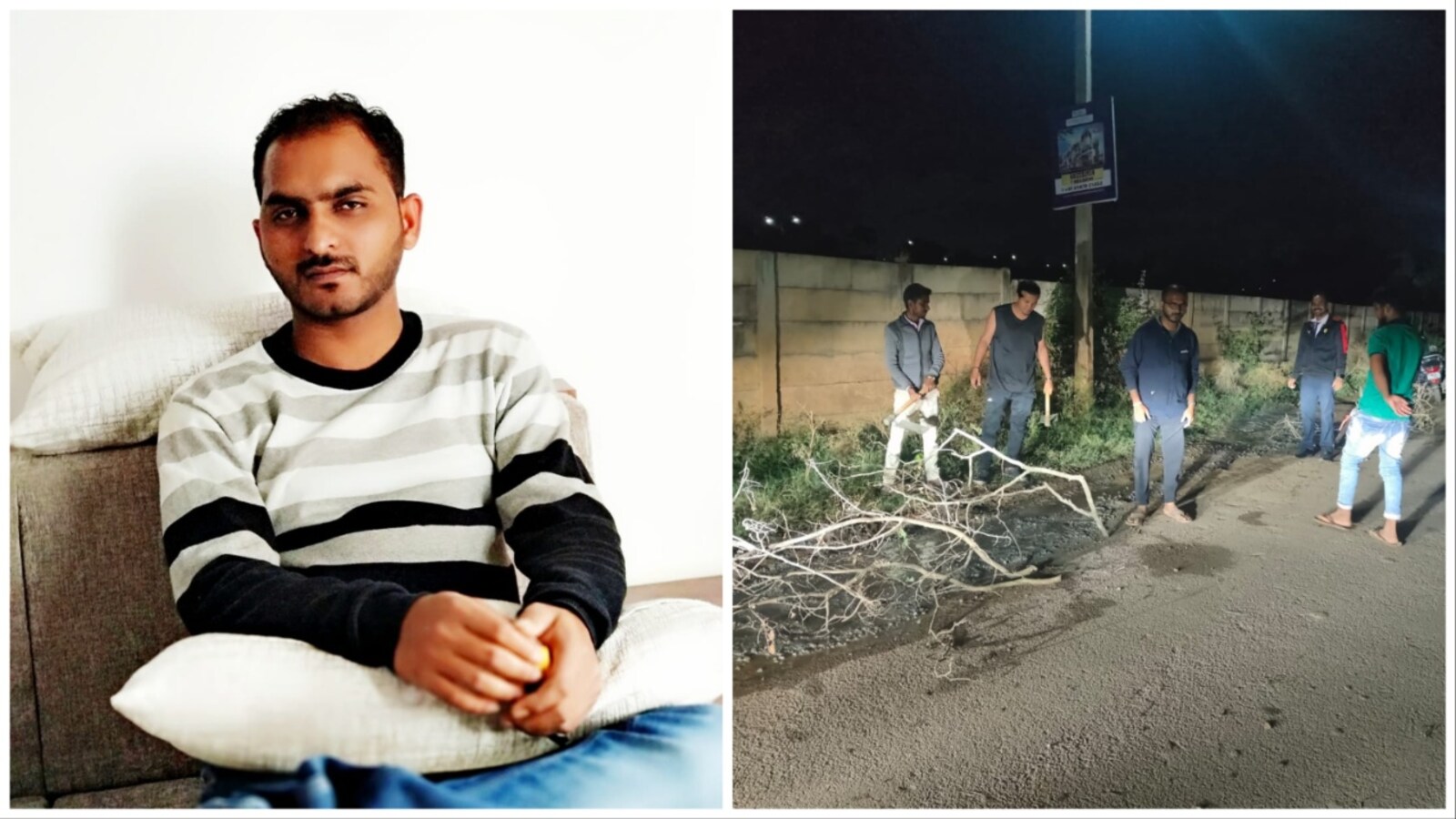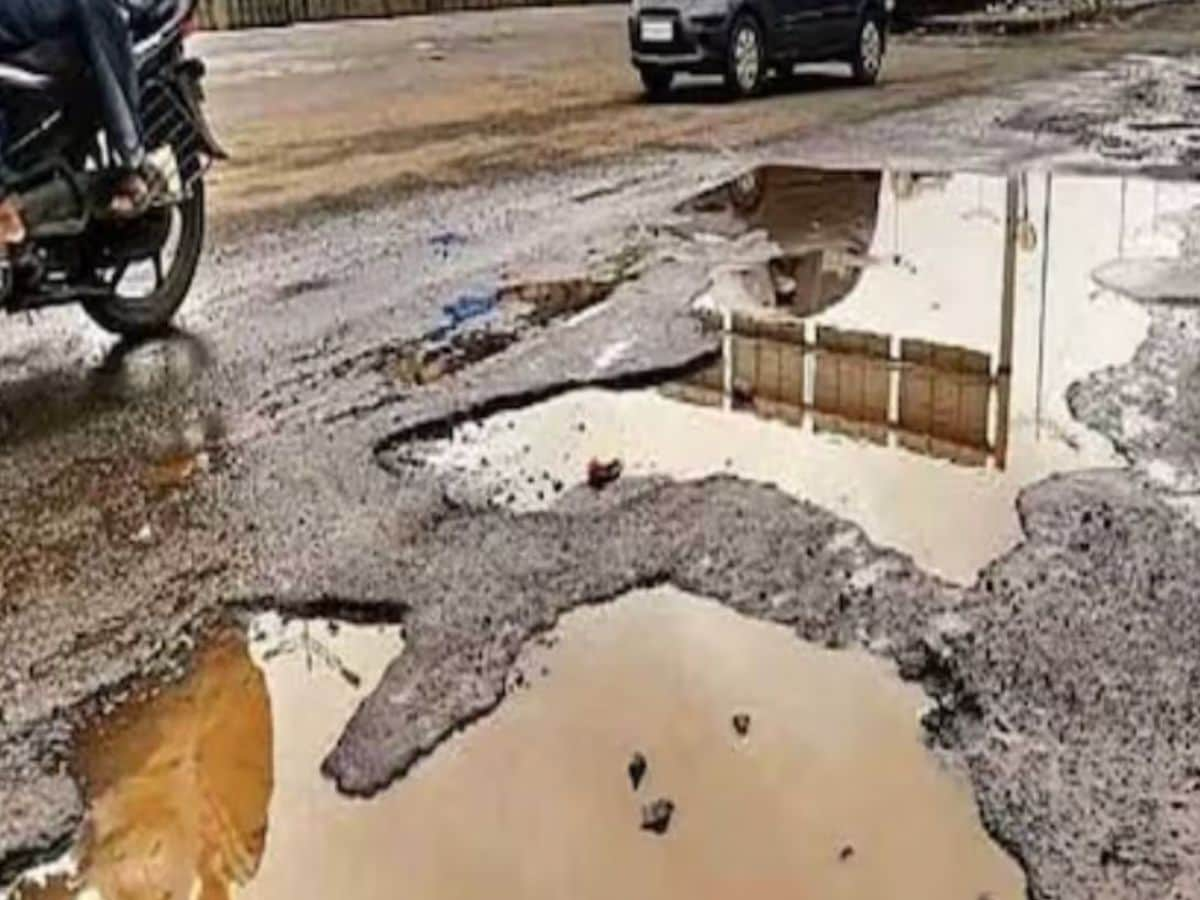Bengaluru Techie Takes INR 2.7 Lakh Loan To Fix Potholes Amid Government Inaction: #NoDevelopmentNoTax Campaign
Frustrated with government’s inaction and apathy, Bengaluru Techie takes INR 2.7 Lakh loan to fix potholes himself and launches #NoDevelopmentNoTax Campaign.

Bengaluru Techie Takes INR 2.7 Lakh Loan To Fix Potholes Amid Government Inaction: #NoDevelopmentNoTax Campaign
Bengaluru, known as India’s Silicon Valley, is dealing with a problem that appears to be worlds apart from the region’s technological strength. The city’s legendary traffic jams as well as deteriorating road conditions, which are exacerbated by the monsoon season, have long been a source of frustration for the people living there. Amid the disappointment and inaction of the administration, Arif Mudgal, a 32-year-old Bengaluru techie, has emerged as a beacon of change, spearheading efforts to repair and improve the conditions of the city’s pothole-ridden roads.
Taking a Stand Against Neglected Roads
Arif Mudgal’s mission to address Bengaluru’s road problems began five years ago, when he founded the ‘Citizens Group, East Bengaluru,’ an alliance of concerned individuals working to enhance the condition of the road network. Recent occurrences, particularly two separate incidents on Hosa Road, have shaken Arif to his core and pushed him to take decisive action. Arif was inspired to initiate a full-scale effort to address the issue after witnessing a fellow resident suffer injuries in a vehicle accident as well as a delivery agent fracture his leg owing to dangerous potholes.
A woman living near his apartment was injured when the car she was riding in overturned after hitting a pothole, Mudgal recounted. On the night of August 14, he mentioned a delivery agent collided with a car while attempting to avoid a similar pothole, leaving him with a fractured leg. He also stated that he later discovered he is from Mandya and is the sole breadwinner for his nine-member family. These incidents disturbed and unsettled him very much.
Arif Mudgal carried out an unexpected move that says volumes about his determination towards betterment, he obtained a loan of INR 2.7 lakh to support the pothole-fixing initiative’s execution. Arif’s actions represent the frustration that many people feel towards the absence of accountability from the government, despite the fact that he acknowledges that this amount is far from adequate to reconstruct the infrastructure of roads.

A Ray of Hope Amidst Adversity
The work of Arif Mudgal has not gone unnoticed. His “Citizens Group, East Bengaluru,” which concentrates on the neighbourhoods of Choodasandra, Halanayakanahalli, and Muneshwara Layout, is pooling its funds to repair the ravaged roadways. The ‘NoDevelopmentNoTax’ campaign, started by this group recently, calls on locals to forego paying property taxes in an effort to protest the absence of improvements.
They have frequently contacted the local representatives, but their cries for improved streets as well as civic improvements have been ignored. One of the group members, Mithilesh Kumar, noted that the administration seems unconcerned with their condition. The campaign highlights the growing resentment among locals who believe their issues are being ignored.
The Power of Collective Action
On one hand where some netizens have proposed an alternative approach of paying taxes and then demanding improved civic amenities afterward, Arif Mudgal’s ‘NoDevelopmentNoTax’ movement resonates with those people who believe in the power and impact of collective action. As politicians continue to ignore their concerns, residents are using this campaign to take issues into their own hands and demand accountability from those who are in power.
In an era where digital platforms have amplified the voices of the public, Arif Mudgal’s actions display the immense potential of ordinary citizens who are determined to bring about change in the society. The ‘NoDevelopmentNoTax’ movement can be seen as a reminder that even in the midst of bureaucratic indifference, dedicated individuals may come together to bring about significant change.
Arif Mudgal’s brave endeavour to fix these neglected thoroughfares speaks not only to his tenacity but also to the harsh reality of a government failing in its fundamental duties as Bengaluru’s citizens navigate an intricate network of pothole-filled roads. People who put their faith as well as tax money in the hands of their elected officials are let down by the authorities’ indifference to the basic infrastructure demands of their constituents. This is a disgrace to the government.

Government’s Duties and Their Disastrous Shortcomings
The provision of basic services as well as upkeep of the infrastructure required for the welfare and advancement of citizens fall under the broad purview of the government. Among these fundamental responsibilities, maintaining effective and safe roadways is a vital one. Roads are the arteries of a city, allowing people, products, as well as services to travel freely. Neglecting their maintenance has serious negative effects, including prolonged traffic jams, increased accident risks, along with harm to the vehicles.
However, Bengaluru’s roadways have become a terrifying maze of potholes, endangering both lives and livelihoods, especially during the rainy season. The government’s inaction on this matter not only causes its people frustration, but also actual harm. The example of Arif Mudgal’s choice to obtain a loan for road repairs is representative of the government’s disregard of its responsibility.
Broken Promises and the Taxpayer’s Dilemma
When taxpayers faithfully pay their taxes, they do so with the implicit notion that their money would be used to further the welfare of the community. It is an investment in a guarantee that their elected officials will provide necessary services and uphold the system as a whole. However, as Arif’s revelation unfolds, it becomes clear that this deal has been broken. The roadways, which were intended to be markers of connectedness as well as development, are instead tarnished by neglect, putting the safety and wellbeing of those who use them on a regular basis in jeopardy.
A powerful retaliation to this deception is Arif’s “NoDevelopmentNoTax” campaign. By refusing to pay their property taxes, residents express their displeasure with a government that takes the money they pay but refuses to live up to its end of the bargain. This movement aims to take back control and accountability by making elected leaders realize that their citizens are not going to sit and tolerate half-hearted measures.
Empowerment Through Collective Action: A Bittersweet Triumph
Arif’s persistence deserves to be praised, but it is troubling that people have to go to such extreme approaches to fill the gaps left by a negligent and irresponsible government. Governance ought to be enhanced by collective action, not replaced by it. The magnitude of the issue is demonstrated by the fact that people are forced to launch campaigns and obtain loans to solve the very issues that taxes are meant to solve.
A functioning government should be proud of its capacity to address the issues that affect its constituents. Roads ought not to serve as a battleground or as an exhibition space for the results of government neglect. Arif’s story serves as more of a warning about governmental failure than a testament to the power of mass movement.

A Call for Change: Reclaiming Government’s Responsibility
The story of Arif Mudgal parallels the demands for responsive government made by Bengaluru’s citizens as a whole. The duty of a government goes beyond paperwork; it is a dedication to enhancing society. The state of Bengaluru’s roadways as well as the city’s residents’ subsequent behavior show a striking contrast between their unfulfilled obligations.
Recalibrating priorities is necessary for the future. The voice of voters demanding not only smooth roads but also the assurance of transparent government is growing, and elected officials must pay attention. It is high time for the government to take note of the issues that affect its constituents and strive relentlessly to uphold its duties.
The project of Arif Mudgal serves as a reminder that city residents are more than just bystanders in their city’s story; they are its creators. Bengaluru is at a crossroads, and the government must decide whether to fulfil its end of the agreement and win back the trust of the people. Recognizing the disappointment, taking the necessary lessons from it, and setting out on a mission to restore infrastructure, trust, as well as the city itself are the first steps on the path to transformation.




